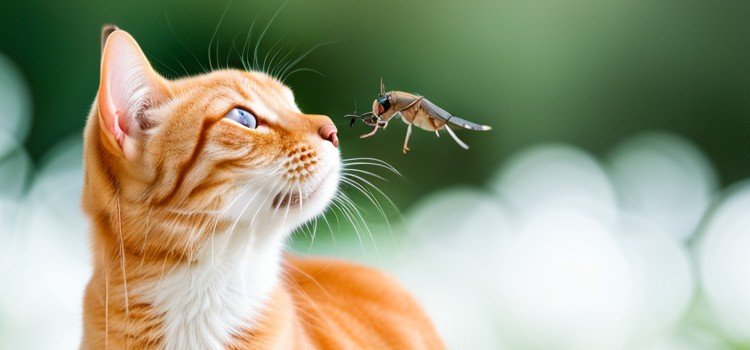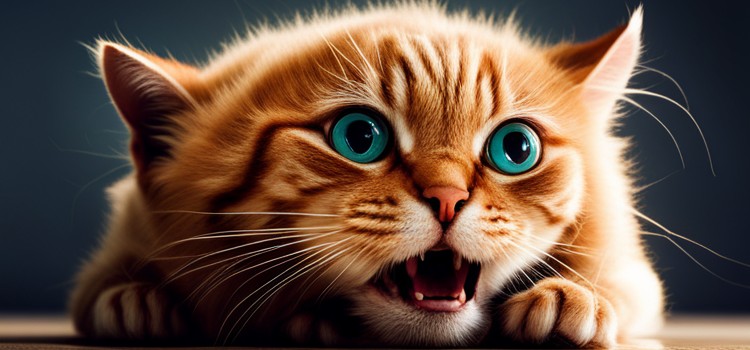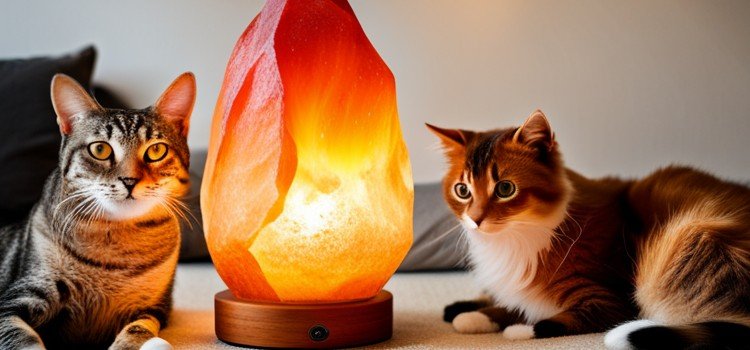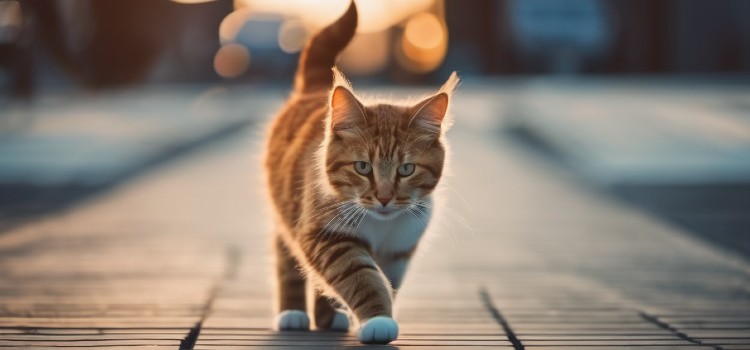As an Amazon Associate committed to the mission of improving the lives of our readers, Live-Clear.com receives a small commission from eligible purchases made through our affiliate links. This revenue enables us to keep producing insightful articles and other material.
Cats scratch at mirrors due to their instinct to mark their territory and defend themselves from perceived threats. This behavior is natural and common among cats.
Mirrors can be a fascinating object to cats, who may think that they are encountering another feline. However, a cat’s natural instinct to defend their territory and mark their presence is also at play. Scratching at a mirror leaves visual and olfactory marks, both of which signal to other cats that this space belongs to them.
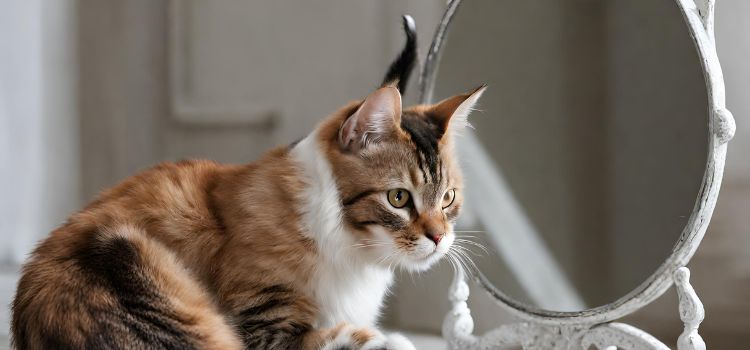
It’s also possible that cats may scratch mirrors as a form of play or as a way to relieve stress or frustration. While it can be frustrating for pet owners, providing cats with appropriate scratching surfaces can help redirect this behavior.
Cats And Their Strange Behaviors
Cats are fascinating creatures, and their strange behaviors often leave their owners puzzled. From scratching at the furniture to hiding in boxes, cats have unique habits that can be both amusing and frustrating. One behavior that often leads to confusion is their obsession with mirrors. Cat owners may wonder why their beloved pet is scratching at their own reflection. In this blog post, we will explore this strange behavior and offer some insights into your cat’s psyche.
Unusual Yet Common
Scratching at mirrors may seem like an unusual behavior, but it is actually quite common among house cats. When cats see their reflection in a mirror, they may become so preoccupied with it that they feel the need to investigate. This can often lead to scratching in an attempt to interact with the “other” cat in the mirror. This behavior is not limited to mirrors; cats may also react in the same way to other reflective surfaces such as windows or glossy surfaces.
Why Study Cat Behavior?
Many cat owners may wonder why there is a need to study cat behavior. After all, cats are generally low-maintenance pets that provide companionship and entertainment. However, understanding a cat’s behavior can help owners create a better home environment for their feline friends. By understanding why cats exhibit certain behaviors, owners can modify their living spaces and routines to better accommodate their pets.
- Studying cat behavior can help owners recognize signs of stress or illness in their pets.
- Understanding a cat’s behavior can help owners prevent destructive behavior such as scratching at furniture and curtains.
- By studying cat behavior, owners can create better relationships with their pets. A better understanding of their cat’s likes and dislikes can lead to a happier pet and a happier owner.
So, the next time your cat scratches at a mirror, don’t be too worried – it’s simply your pet’s fascination with its own reflection. Understanding and accepting this behavior can help bring peace to both you and your furry little friend.
The Mystery Of Mirror Scratching
As much as we love cats, sometimes they exhibit behaviors that leave us puzzled. One such behavior that baffles many cat owners is the incessant scratching at mirrors. Have you ever wondered why your cat suddenly goes into clawing frenzy mode whenever it spots its reflection?
Observation Of Cat Behavior
A closer look at your cat’s behavior will help you decode the mystery of mirror scratching. Cats have a natural instinct to scratch and mark their territory. Scratching is also a form of exercise that helps them stretch their muscles. When cats see their reflection in a mirror, they don’t recognize it as themselves. They perceive it as another cat, and their territorial instincts kick in.
Your cat sees its reflection as an intruder in its territory and wants to assert dominance through territorial marking. Scratching serves this purpose as it leaves behind visual marks as well as a scent from their paw pads that warns other cats to stay away.
Feline Psychology And Instincts
Cats have complex psychological and instinctual traits that play a significant role in their behavior. Their predatory instinct drives them to stalk and hunt imaginary prey, which they can experience when they see their reflection. They may also perceive their reflection as a potential rival and attempt to intimidate it through aggressive behavior such as scratching.
Feline psychology also suggests that your cat may scratch the mirror out of frustration or stress. A cat may direct their energy towards scratching when they feel anxious or agitated, and seeing their reflection can increase their stress levels.
Observing your cat’s behavior and understanding their instincts can help you solve the mystery of mirror scratching. While this behavior can be frustrating, it is important to remember that it is natural and instinctual for cats. It is essential to provide your beloved pet with scratching posts and toys to redirect their energy from mirrors and other inappropriate areas.

Understanding A Cat’s Mind
Cats scratch at mirrors because they get confused by their reflection and see it as another cat. They may also seek attention or use it as a way to mark their territory. Understanding a cat’s instincts and behaviors can help prevent unwanted scratching.
Cats are known for their quirky behaviors, and scratching at mirrors is no exception. Many cat owners have witnessed this strange behavior in which their cat scratches relentlessly at a mirror – but why? Understanding a cat’s mind and behavior can help us better comprehend this peculiar feline characteristic.
Scratching As A Form Of Communication
Scratching, for cats, is a natural form of communication. It’s how they mark their territory, stretch their limbs, and release tension. Mirrors, though, pose an interesting challenge for cats. Due to their reflective surfaces, cats often view their reflection as another feline intruder in their space. Scratching at the mirror is a way for your cat to stake their claim and assert dominance.
Cats Vs Kittens – Different Techniques
While adult cats often employ a more aggressive scratching technique, kittens tend to be gentler with their scratching. Kittens scratch more for play, exploration, and learning their own boundaries. It’s essential to provide kittens with a variety of scratching posts and toys to redirect their scratching behavior.
Female Vs Male Cats – Different Reasons
Female and male cats scratch for different reasons. Male cats, in particular, like to scratch as a way to attract a mate or mark their territory. Female cats, on the other hand, may scratch more when they’re feeling anxious or stressed. Ensuring your cat has enough resources such as food, water, and toys, and providing adequate physical and mental stimulation, can reduce stress levels and diminish scratching behavior.
Boredom And Stress – Effect On Behavior
Boredom and stress can significantly impact a cat’s behavior. Cats who spend an excessive amount of time alone are more likely to scratch at mirrors or furniture. Similarly, cats who are stressed or feeling anxious may also act out by scratching. Playtime and interactive toys can alleviate boredom and stress and redirect your cat’s scratching behavior.
Understanding a cat’s mind and behavior plays a crucial role in interpreting their scratching at mirrors. Recognizing the underlying reasons for this behavior and addressing them can curb the habit and promote overall feline well-being.
Scientific Explanation For Scratching
Cats scratch not only to sharpen their claws, but also to mark their territory. When they see their reflection in a mirror, they may interpret it as another cat invading their space and try to defend it. This explanation is rooted in feline behavior and has a scientific basis.
Cats are known for their playful nature and sometimes quirky behavior, including scratching at mirrors. While it can be frustrating for pet owners to see their mirrors scratched up, there are several reasons why cats engage in this behavior. In this article, we will explore the scientific explanations behind why cats scratch at mirrors, including causes for anxiety, aggression, territorial behavior, and curiosity.
Blurred Reflections – Cause For Anxiety
Cats have good eyesight but they are often sensitive to visual stimuli, including reflections. A blurred reflection may make them anxious, causing them to scratch the mirror. Additionally, if a cat sees another cat’s reflection in the mirror, it may become territorial and want to assert its dominance.
Increased Playfulness – Cause For Aggression
Cats love to play, and sometimes scratching at mirrors can be a part of their playfulness. When cats feel energetic and playful, they may use the mirror as a toy, pawing and scratching at it. However, this behavior can quickly turn to aggression if not monitored, causing damage to both the mirror and the cat’s paws.
Scent Marking – Cause For Territorial Behavior
Cats use scent marking as a way to signal their territory. When a cat scratches at a mirror, they leave behind their scent. This can cause them to return to the mirror repeatedly to refresh their scent, as well as to check and see if any other cats have been in their space.
Tactile Stimulation – Cause For Curiosity
Cats are curious creatures and are often stimulated by tactile sensations. Scratching at a mirror provides a satisfying tactile sensation for cats, in addition to making noise and causing vibrations. Cats may scratch at mirrors simply because it feels good to them.
Cats scratch at mirrors for a variety of reasons, including anxiety, aggression, territorial behavior, and curiosity. Understanding these behaviors and motivations can help pet owners create a more stimulating and happy environment for their feline friends.

Tips For Cat Owners
If you find your cat scratching at mirrors, it could be because they are trying to assert dominance or they see their own reflection as a separate cat. Provide your cat with scratching posts and toys to redirect their behavior. Avoid punishing them as it can lead to anxiety and stress.
Cats are curious creatures and love to explore their surroundings. During their adventures, they might come across a shiny surface like a mirror, which they may start to scratch. This behavior is normal, but it can be annoying and cause damage to your home. As a cat owner, it’s important to understand why your cat scratches at mirrors and how to prevent it. Below are some tips for cat owners to help curb this behavior.
Trimming Claws
One reason why cats scratch at mirrors is because it allows them to sharpen their claws. To minimize this behavior, make sure to trim your cat’s claws regularly. This will help keep their claws at a manageable length and reduce the need to scratch. You can also use a scratching post to divert their attention away from the mirrors.
Providing Scratching Posts
Providing your cat with a scratching post is essential for their wellbeing. A scratching post helps sharpen their claws, stretch their muscles, and release their energy. Place a scratching post near the mirror to redirect your cat’s attention away from the shiny surface. You can also try different types of scratching posts like vertical, horizontal or angled to see what works best for your feline friend.
Redirecting Attention
If your cat insists on scratching the mirror, redirect their attention to another activity. Establish a playtime routine with interactive toys like balls or string toys. You can also use treats or catnip to reward good behavior and distract them from scratching.
Creating A Calming Environment
Cats scratch when they are anxious, bored, or stressed. Creating a calming environment will help reduce their anxiety levels and prevent them from scratching at mirrors. You can try using Feliway, a synthetic version of the feline facial pheromone, which helps calm cats in stressful situations. Also, provide your cat with a cozy bed and a hiding spot to help them feel secure.
Cats scratch for many reasons, and as a cat owner, understanding and addressing these reasons is important. By trimming claws, providing scratching posts, redirecting attention, and creating a calming environment you can help minimize your cat’s desire to scratch at mirrors and preserve your home decor.
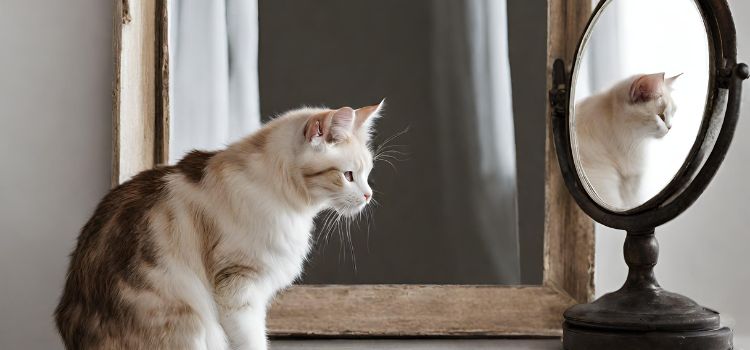
Conclusion
Cats scratching at mirrors is a common behavior that pet owners might find frustrating. However, it is important to understand why cats do this and what can be done to prevent it. Scratching mirrors could be a sign of stress, anxiety or simply a way for your feline friend to mark its territory.
Frequently Asked Questions Of Why Do Cats Scratch At Mirrors
Cats are fascinated by mirrors because they don’t understand what they are. They perceive their reflection as another cat and want to interact with it. Additionally, the movement of the reflection is intriguing to them. However, not all cats are obsessed with mirrors, as it depends on the cat’s personality and individual experiences.
Cats scratch at glass because they may see something outside that attracts them, such as birds or insects. This behavior can also indicate a desire for attention or a need for more stimulation. Providing scratching posts and toys can help redirect this behavior.
Cats run into mirrors because they mistake their reflection for another animal and want to play or fight. They can also be curious and want to explore the reflection. It’s a natural behavior and not a cause for concern.
Cats fight themselves in the mirror because they think their reflection is another cat. This behavior is common among cats and usually harmless. It’s their natural instinct to defend their territory, even if it’s just a reflection. So, your cat is not trying to hurt anyone, just having fun playing with himself.
Cats scratch at mirrors out of curiosity or territorial behavior.
Providing appropriate scratching posts, regular playtime, and reducing stressors can help curb this behavior. Remember, with a little patience and understanding, you can help your cat enjoy its environment without ruining your mirrors.
Amazon and the Amazon logo are trademarks of Amazon.com, Inc, or its affiliates.
